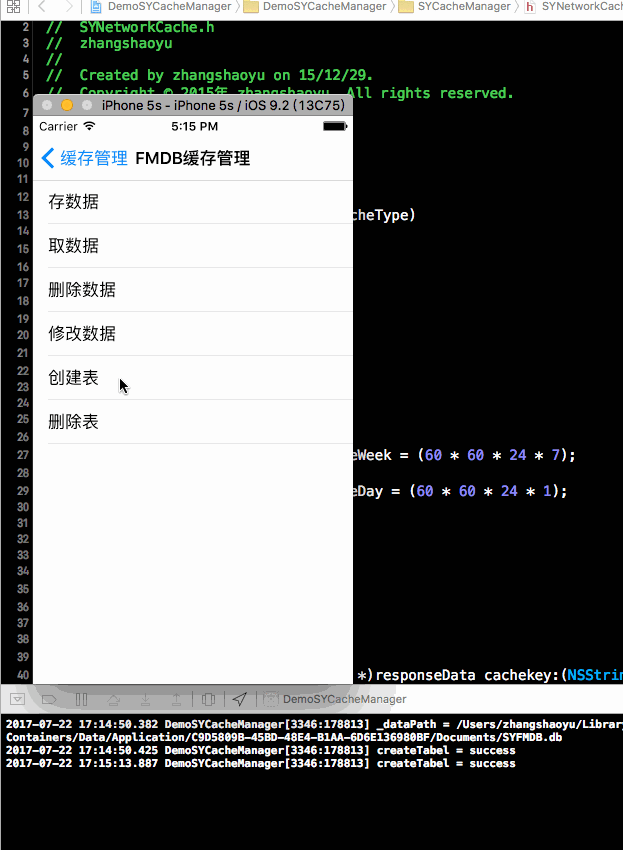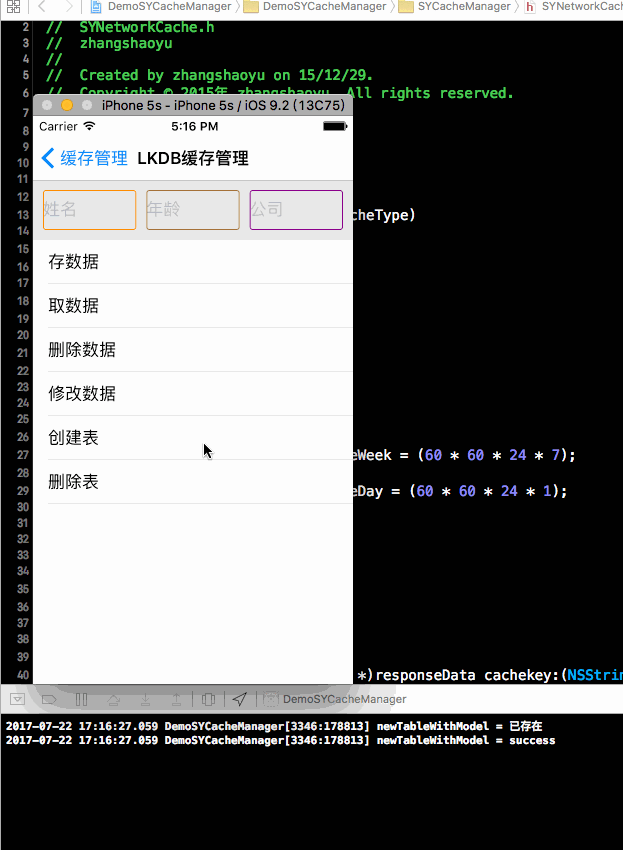SYCacheManager使用FMDB、LKDB进行二次封装,缓存数据。
FMDB的基本使用
使用FMDatabase操作数据,使用时,必须保证如下三点:
(1)已创建数据库
(2)操作前,必须打开数据库
(3)操作后,必须关闭数据库
数据库存储路径
- (NSString *)dataPath
{
if (_dataPath == nil)
{
NSArray *paths = NSSearchPathForDirectoriesInDomains(NSDocumentDirectory, NSUserDomainMask, YES);
// NSArray *paths = NSSearchPathForDirectoriesInDomains(NSCachesDirectory, NSUserDomainMask, YES);
NSString *documentDirectory = [paths objectAtIndex:0];
_dataPath = [documentDirectory stringByAppendingPathComponent:@"cache.db"];
NSLog(@"_dataPath = %@", _dataPath);
}
return _dataPath;
}
FMDatabase实例化,并创建数据库
- (FMDatabase *)dataBase
{
if (_dataBase == nil)
{
_dataBase = [FMDatabase databaseWithPath:self.dataPath];
}
return _dataBase;
}
- 创建表
if ([self.dataBase open])
{
NSString *createTabel = @"CREATE TABLE if not exists CompanyTable (departmentId text PRIMARY KEY,departmentName text,departmentStatus text)";
BOOL isResult = [self. dataBase executeUpdate:createTabel];
NSLog(@"createTabel = %@", (isResult ? @"success" : @"error"));
[self.dataBase close];
}
- 删除表
if ([self.dataBase open])
{
NSString *deleteTabel = @"DROP TABLE CompanyTable";
BOOL isResult = [self. dataBase executeUpdate:deleteTabel];
NSLog(@"deleteTabel = %@", (isResult ? @"success" : @"error"));
[self.dataBase close];
}
- 保存数据
if ([self.dataBase open])
{
NSString *saveData = @"INSERT INTO CompanyTable (departmentId, departmentName, departmentStatus) VALUES (?,?,?)";
BOOL isResult = [self. dataBase executeUpdate:saveData, @"168", @"互联网部门", @"禁用"];
NSLog(@"saveData = %@", (isResult ? @"success" : @"error"));
[self.dataBase close];
}
- 删除数据
if ([self.dataBase open])
{
NSString *deleteData = @"DELETE FROM CompanyTable";
BOOL isResult = [self. dataBase executeUpdate:deleteData];
NSLog(@"deleteData = %@", (isResult ? @"success" : @"error"));
[self.dataBase close];
}
- 修改数据
if ([self.dataBase open])
{
NSString *modifyData = @"UPDATE CompanyTable set departmentStatus = ? where departmentName = ?";
BOOL isResult = [self. dataBase executeUpdate:modifyData, @"启用", @"互联网部门"];
NSLog(@"modifyData = %@", (isResult ? @"success" : @"error"));
[self.dataBase close];
}
- 读取数据
if ([self.dataBase open])
{
NSString *readData = @"SELECT * FROM CompanyTable WHERE departmentName = ?";
FMResultSet *result = [self. dataBase executeQuery:readData, @"互联网部门"];
// 读取全部数据
while ([result next])
{
NSString *idStr = [result stringForColumn:@"departmentId"];
NSString *nameStr = [result stringForColumn:@"departmentName"];
NSString *statusStr = [result stringForColumn:@"departmentStatus"];
NSLog(@"查找数据成功。\nid = %@, name = %@, status = %@", idStr, nameStr, statusStr);
}
[self.dataBase close];
}
// 读取单条数据
if ([result next])
{
NSString *idStr = [result stringForColumn:@"departmentId"];
NSString *nameStr = [result stringForColumn:@"departmentName"];
NSString *statusStr = [result stringForColumn:@"departmentStatus"];
NSLog(@"查找数据成功。\nid = %@, name = %@, status = %@", idStr, nameStr, statusStr);
}
执行语句使用的四种等价情况,使用更新语句示例
- 直接使用完整的SQL
NSString *sqlUpate = @"UPDATE CompanyTable(departmentStatus) values('启用')";
[self.dataBase executeUpdate:sqlUpate];
- 使用不完整的SQL,里面含有待定字符串"?",需要后面的参数进行替代
NSString *sqlUpate = @"UPDATE CompanyTable set departmentStatus = ? where departmentName = ?";
[self.dataBase executeUpdate:sqlUpate, @"启用", @"互联网部门"];
- 使用不完整的SQL,里面含有待定字符串"?",需要数组参数里面的参数进行替代
NSString *sqlUpate = @"UPDATE CompanyTableUPDATE CompanyTable(departmentStatus) values(?)";
[self.dataBase executeUpdate:sqlUpate withArgumentsInArray:@[@"启用"]];
- SQL语句字符串可以使用字符串格式化,这种我们应该比较熟悉
NSString *sqlUpate = @"UPDATE CompanyTable(departmentName) values(%@)";
[self.dataBase executeUpdateWithFormat:sqlUpate, @"启用"];
LKDB的基本使用
通常使用时,采用单例设计模式进行使用。
数据库存储路径:只需要设置数据库名称即可,实例化时已实现创建路径方法。
实例化
- (instancetype)init
{
self = [super init];
if (self)
{
self.dataHelper = [[LKDBHelper alloc] initWithDBName:@"LKDB.db"];
}
return self;
}
单例
/// 单例
+ (SYCacheManager *)shareCache
{
static SYCacheManager *sharedManager;
static dispatch_once_t onceToken;
dispatch_once(&onceToken, ^{
sharedManager = [[self alloc] init];
assert(sharedManager != nil);
});
return sharedManager;
}
- 创建表
- (BOOL)newTableWithModel:(Class)class
{
BOOL isResult = NO;
if ([self.dataHelper isExistsWithTableName:NSStringFromClass(class) where:nil])
{
isResult = YES;
NSLog(@"newTableWithModel = 已存在");
}
else
{
isResult = [self.dataHelper createTableWithModelClass:class];
}
NSLog(@"newTableWithModel = %@", (isResult ? @"success" : @"error"));
return isResult;
}
- 删除表
- 删除所有表
- 删除指定表
- (void)deleteAllTableModel
{
[self.dataHelper dropAllTable];
}
- (BOOL)deleteTableWithModel:(Class)class
{
BOOL isResult = [self.dataHelper dropTableWithClass:class];
NSLog(@"deleteTableWithModel = %@", (isResult ? @"success" : @"error"));
return isResult;
}
- 保存数据
- (BOOL)saveModel:(id)model
{
BOOL isResult = NO;
if ([self.dataHelper isExistsModel:model])
{
// 已存在时,先删除,且删除成功再保存
if ([self deleteModel:model])
{
isResult = [self.dataHelper insertWhenNotExists:model];
}
}
else
{
// 不存在时,直接删除
isResult = [self.dataHelper insertWhenNotExists:model];
}
NSLog(@"saveModel = %@", (isResult ? @"success" : @"error"));
return isResult;
}
- 删除数据
- 删除数据
- 删除指定条件的数据
- (BOOL)deleteModel:(id)model
{
BOOL isResult = [self.dataHelper deleteToDB:model];
NSLog(@"isResult = %@", (isResult ? @"success" : @"error"));
return isResult;
}
- (BOOL)deleteModel:(Class)class where:(id)where
{
BOOL isResult = [self.dataHelper deleteWithClass:class where:where];
NSLog(@"isResult = %@", (isResult ? @"success" : @"error"));
return isResult;
}
- 修改数据
- 修改数据
- 修改指定条件的数据
- (BOOL)updateModel:(id)model
{
BOOL isResult = [self.dataHelper updateToDB:model where:nil];
NSLog(@"updateModel = %@", (isResult ? @"success" : @"error"));
return isResult;
}
- (BOOL)updateModel:(Class)class value:(NSString *)value where:(id)where
{
BOOL isResult = [self.dataHelper updateToDB:class set:value where:where];
NSLog(@"updateModel = %@", (isResult ? @"success" : @"error"));
return isResult;
}
- 查找数据
- (NSArray *)readModel:(Class)class where:(id)where
{
// 根据 and 条件 查询所有数据 NSString *conditions = @"age = 23 and name = '张三1'";
// 根据 字典条件,查询所有数据 NSDictionary *conditions1 = @{@"age" : @23, @"name" : @"张三1"};
// 根据 or 条件,查询所有数据 NSString *conditions2 = @"age = 23 or ID = 5";
// 根据 in 条件,查询所有数据 NSString *conditions3 = @"age in (23, 24)";
// 根据 字典 in 条件,查询所有数据 NSDictionary *conditions4 = @{@"age" : @[@23, @24]};
// 查询符合条件的数据有多少条 NSString *conditions5 = @"age = 23 and name = '张三1'";
NSArray *array = [self.dataHelper search:class column:nil where:where orderBy:nil offset:0 count:0];
return array;
}

